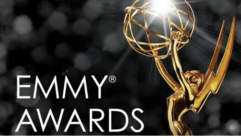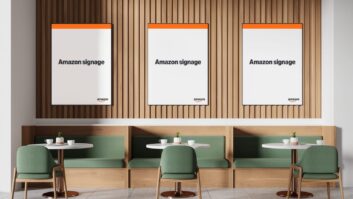You May Have The Voice, But an American Idol May Be Your Calling
Robert Venable Recently Won His Fourth EMMY Award For His Work as the Music Mixer for The Kelly Clarkson Show
Gilbert, Ariz., June 20, 2024 – Robert Venable attended the University of Central Arkansas on a full vocal performance scholarship before deciding that he really wanted to make a career on the other side of “the glass”.
Now, he is an EMMY®- and Dove Award-winning, GRAMMY-nominated record producer/mixer/engineer based in Nashville, Tenn. who has worked with GRAMMY-winning and multi-platinum recording artists including Megadeth, Kelly Clarkson, Twenty One Pilots, Kutless, MuteMath, Kim Burrell, Neal McCoy, and more. He is also a Billboard #1 songwriter with Shoalsville Music and SESAC.
As the current music mixer for The Kelly Clarkson Show, he and his audio team recently won their fourth Daytime EMMY Award on June 7.
How did he get here?

“As the oldest of four kids, my mom said she knew I was going to be a musician because of the rhythm I could keep hitting pots and pans with a spoon before I could talk,” Venable recalled. “I don’t really come from a musical family, but I attribute a lot of my ability to hear harmonies and melodies to my church upbringing. I was in choir and band through middle school and high school, and my closest friends were on the drumline with me.”
Venable spent as much time as he could in the choir and band rooms with his friends, and playing in various bands. His love for music production began with a vintage Slingerland drum kit that was given to him by his aunt at age ten. He then saved up for his first piece of audio gear…a 4-channel mixer from Radio Shack.
“I had a junky microphone I’d plug into one channel and a radio into another, and maybe a tape player into another, and I would mix from song-to-song, pretending I was a DJ,” Venable reminisced. “Then I started overdubbing using the tape player. I would record myself beatboxing, then play that back on one tape while recording that beat plus me humming on top of it onto another tape, then play that back while adding harmonies until I had a ‘fully produced’ song.”
Although Venable had the vocal talent to earn a full college scholarship while in his late teens, he knew production was what he wanted to do with the rest of his life.
“When I decided I wanted to get into audio production and engineering, I started looking for audio schools in 2002, and that’s how I learned about The Conservatory of Recording Arts & Sciences (CRAS),” Venable continued. “I interviewed with them over the phone and when there was an opening, they offered me the spot. It was quick…I had to be at the school in less than two weeks if I wanted to enroll in the next cycle. I really wanted to be there, I knew I needed to be there, and so I picked up and moved to Arizona almost immediately.”
Venable said he was virtually a sponge while attending CRAS.
“I wasn’t really into touring or wanting to be on the road…I wanted to be in the recording studio being creative and capturing sounds, and making them great,” Venable explained. “The education I got at the CRAS is invaluable. It was a lot of information taught by very talented industry professionals. I soaked it all in, asked a lot of questions, and filled notebook after notebook full of pages of diagrams, settings, notes, and various tips and tricks. Once I got past being star struck by the instructors and what albums they’ve worked on or what artist they’ve worked with that I admired, I focused on every word they said, and even more importantly, what they did between the words they said. I noticed if they tweaked a knob a little bit, or nudged a fader, I would ask why they did that if I didn’t hear the obvious audible change. Being at CRAS made me even more excited about music, and it acted like a slingshot to get me where I needed to be.”
Necessary for graduation, Venable then interned at nearby Phase 4 studio in Tempe, Ariz. where he had the opportunity to work on his very first major album The System Has Failed by thrash-metal legends Megadeth where he said he learned a lot from Dave Mustaine (Megadeth founder/guitarist/singer) and Ralph Patlan (head engineer at Phase 4). Venable then also interned at The Saltmine Studio in Mesa, Ariz.
So, how did this drummer from northwest Arkansas end up working with American Idol winner Kelly Clarkson?
“It’s kind of a fun story how I got that gig,” Venable recalled. “I had engineered drums on a couple of Kelly’s records. Her drummer, Lester Estelle, Jr., has been my best friend for almost two decades. We’ve owned recording studios together and have a musical chemistry which just works. So, when he needed to record drums on some of Kelly’s albums, I’d engineer them. Jason Halbert, Kelly’s music director and producer, sat in on one of the sessions, and that’s how I got to know him, as well. Fast forward to 2020 and we are in a pandemic. I was asked to do a spec mix as an audition to be the music mixer for The Kelly Clarkson Show, to be blindly judged by the band to find the right person for the job. I got the offer, accepted it, and spent the next few years flying from Nashville to Burbank every week. The show recently moved to Rockefeller Center in Manhattan, and I’ve since transitioned to be able to mix the show live, remotely, from my home studio in the Nashville area.”
As the music mixer with The Kelly Clarkson Show, Venable said it is a unique position.
“I only mix music, so not the interviews or lavalier mics, just the music performances, bumps in and out of commercials when the band plays, and little band stings for games or title cards,” Venable explained. “During taping, I’ll mix live for the producers/directors’ feed, anyone in the green rooms or hallway, remote feeds, etc., and then I have the luxury of remixing anything that needs to be touched up. But most of the show is mixed live, on the fly, and that makes it to the broadcast. It’s fast-paced, can be stressful, but it’s so much fun for me to work with various guest artists.”
Venable said he has a near unlimited library of stories since he started working with Clarkson. During COVID while everyone was masked up, he had long and fun conversations with both Rainn Wilson and Mayim Bialik, and not knowing who they were at the time until later on because they were hidden behind masks. But having the opportunity to record and mix legends such as Dolly Parton, Garth Brooks, Rod Stewart, P!nk, Alanis Morissette, Jewel, and many more is what keeps him excited about his work. “Not to mention my boss is the original American Idol!,” Venable exclaimed.
Since he is living his dream, Venable has sage advice for CRAS students and the next generation of audio engineering professionals.
“Be present during your education and pay attention, hang out as often as you can in the studios, get to know your instructors, and ask all the questions you possibly can,” he said. “Study wherever you are. While at CRAS, I printed off the signal flow diagram for an SSL console and taped it to the back of my bathroom door so, while I was in there, I could look at it and commit it to memory. Learn your DAW’s shortcuts, don’t cut corners, and put in the work. It’s all worth it.”
Finally, Venable advised not to aim for awards or accolades.
“Those are just things,” he explained. “I’m proud of the awards and accolades I have to my name, but that’s not what this career is about. We are here to make music, to capture sounds, to entertain through our art, often without any recognition. If you focus on the music and allow it to come alive, the awards and accolades will come. That being said, I wouldn’t be here if it weren’t for my CRAS education.”
Venable’s recording studio is just 20 minutes south of Nashville, where he produces and mixes his projects. In addition to music production and his work on The Kelly Clarkson Show, Venable has mixed music for television, broadcast, film, and web streaming. In addition to music production, Venable is also a drummer. His band, As We Ascend, comprised of former We As Human members Jake Jones and Justin Forshaw, has won multiple awards and had three Billboard Top Five charting singles, including “Tell Me,” which stayed at #1 for several weeks.
# # #
About The Conservatory of Recording Arts & Sciences
The Conservatory of Recording Arts & Sciences is composed of two nearby campuses in Gilbert and Tempe, Ariz. A CRAS education includes broadcast audio, live sound, film and TV audio, music, and video game audio, all taught by award-winning instructors who have all excelled in their individual fields, including sound reinforcement, audio recording and production, digital recording, troubleshooting/maintenance, and music business.
CRAS structured programs and highly qualified teaching staff provide a professional and supportive atmosphere, which is complemented by its small class sizes allowing for individual instruction and assistance for students in engineering audio recordings. CRAS has been providing quality vocational training in audio recording for more than three decades. The curriculum and equipment are constantly being updated to keep pace with the rapid advancements in the music and sound recording industries. CRAS’ course offerings and subject matter have always centered around the skills and knowledge necessary for students’ success in the audio recording industries.
The 11-month program is designed to allow every student access to learn and train in all of the Conservatory’s studios which are comprised with state-of-the-art audio recording and mixing gear, the same equipment used in today’s finest studios and remote broadcast facilities, including Pro Tools 12, API Legacy consoles, SSL AWS consoles, Studer Vista consoles, and much more. All students must complete a 280-hour industry internship to graduate from the Master Recording Program II that may ultimately lead to industry employment.
For more information on the Conservatory of Recording Arts & Sciences, please visit www.cras.edu, contact Kirt Hamm, administrator, at 1-800-562-6383, or email to [email protected].
-30-










